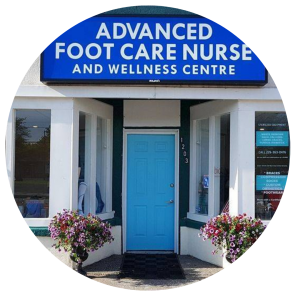The Importance of Foot Care Programs in Long-Term Care and Retirement Homes

- Janis Boudreau
As we age, foot health becomes a vital aspect of holistic care, ensuring the overall well-being and mobility of seniors. In long-term care and retirement homes, foot care programs led by advanced foot nurses are paramount in maintaining the comfort, functionality, and quality of life for residents. This article explores the significance of such programs in promoting foot health and enhancing the overall long-term care experience.
Enhancing Mobility and Independence:
Foot problems can significantly impact mobility and independence among older adults. Corns, calluses, nail disorders, and foot pain contribute to discomfort and restrict residents from engaging in daily activities. Advanced foot nurses play a crucial role in preventing and addressing these issues, promoting enhanced mobility and independence for seniors. By providing regular foot assessments, specialized care, and evidence-based treatments, these professionals ensure that residents can move around comfortably, reducing the risk of falls and accidents.
Preventing Complications and Infections:
Foot care programs help prevent serious complications and infections in long-term care settings. Many seniors suffer from underlying health conditions that can affect their feet, such as diabetes, circulatory disorders, and neuropathy. Advanced foot nurses possess the expertise to identify early warning signs and implement preventive measures, significantly reducing the risk of foot ulcers, infections, and amputations.
Promoting Overall Well-being:
Foot health has an impact that extends beyond the physical realm; it also plays a vital role in improving the residents’ emotional and psychological well-being. Chronic foot pain and discomfort can lead to a decrease in quality of life, limit social interactions and participation in leisure activities. Implementing an advanced foot care program ensures that residents are provided with relief from pain, improving their overall mood, morale, and engagement in daily life.
Individualized, Person-Centered Care:
Advanced foot nurses not only possess in-depth knowledge of podiatry, but they are also trained to provide individualized person-centered care. They understand that each resident has unique foot health needs and preferences. By tailoring treatments and care plans specifically to each individual, advanced foot nurses ensure that residents receive the highest standard of care, fostering trust, comfort, and dignity.
Collaboration with Multidisciplinary Teams:
Foot care programs led by advanced foot nurses afford opportunities for collaboration with multidisciplinary care teams. By working closely with other healthcare professionals, such as doctors, nurses, and
physiotherapists, foot nurses can provide comprehensive care plans that address the residents’ overall health and well-being. This collaborative approach ensures effective communication, coordination, and continuity of care, resulting in holistic services for elderly residents.
Foot care programs led by advanced foot nurses are a fundamental component of long-term care and retirement homes, prioritizing the holistic well-being and mobility of elderly residents. By emphasizing individualized care, prevention, and early intervention, these programs contribute to the overall quality of life for seniors, enhancing their independence, comfort, and overall well-being. Investing in such programs is not only a testament to the commitment of long-term care facilities but also a vital step toward achieving optimal foot health for our aging population.



